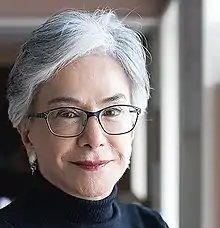Eliana Cardoso
Eliana Anastasia Cardoso (born 28 February 1944)[1] is a professor of economics at the São Paulo School of Economics.[2] She worked at both the World Bank and the IMF. She holds a PhD from the Massachusetts Institute of Technology (MIT) and a master from the Universidade de Brasília.

Career
At the World Bank, she was lead Economist for China from 1993 to 1995. Se was also a Sector Manager in Latin America from 1998 to 2000.[3] She also worked for the research department of the IMF. Cardoso was Secretary for International Affairs at the Ministry of Finance in Brazil.
Publications
Her research is on international economics and macroeconomics. She has published articles on capital flows, inflation, exchange rates and conflict among other things. One of her books explores exchange rate regimes in the Middle East[4] and another one analyses the state of the Cuban economy after communism.[5] She has published many articles and has just short of 5000 citations.[6] She is the 698 most influential female economist in the world according to the RePEc/Ideas ranking.[7]
References
- "Cardoso, Eliana A." LC Name Authority File. Library of Congress. Retrieved 5 April 2020.
- "CARDOSO, Eliana". Sao Paulo School of Economics. 2015-02-26. Retrieved 2020-03-19.
- "Eliana Cardoso". blogs.worldbank.org. Retrieved 2020-03-19.
- Cardoso, Eliana A. (2006). Monetary policy and exchange rate regimes : options for the Middle East. Galal, Ahmed, 1948-. Cairo, Egypt: American University in Cairo. ISBN 978-977-17-2759-0. OCLC 144518950.
- Cardoso, Eliana A. (1992). Cuba after communism. Helwege, Ann. Cambridge, Mass.: MIT Press. ISBN 0-262-03197-3. OCLC 25552807.
- "Eliana Cardoso - Google Scholar Citations". scholar.google.com. Retrieved 2020-03-19.
- "Top Female Economists Rankings | IDEAS/RePEc". ideas.repec.org. Retrieved 2020-03-19.